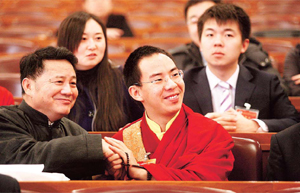GM grain still 'long distance away'
By Shan Juan and Wu Jiao (China Daily)
Updated: 2010-03-11 07:28

Rice strains still require certification from health, quality inspection departments
BEIJING: Genetically modified (GM) foods still have a long way to go before they reach the Chinese market even though the Ministry of Agriculture has certificated two strains of GM rice, a senior rural affairs official said on Wednesday.
Before reaching the shelves, the products need to be certified by government agencies from the health and quality inspection sectors, Chen Xiwen, a member of the Chinese People's Political Consultative Conference (CPPCC) and deputy director of the Central Rural Work Leading Group, said during a panel discussion in Beijing.
Any of these agencies might stop the GM rice from entering the market, he said.
"As a country with a huge population to feed, China should maintain its leading role in the research of advanced agricultural technology," Chen said, adding that the country needs to be prudent in GM production.
GM safety is a hot issue at the NPC and CPPCC sessions, under way in the capital.
In November, the Ministry of Agriculture granted bio-safety certificates to two pest-resistant GM rice varieties and corn - a major step in promoting the research and planting of GM crops. It has became major news given the sensitivity of the issue, coupled with the fact that China is a major rice producer.
China is also the first country in the world that has given a nod to GM staple food, which experts say will pave the way for large-scale commercial cultivation of GM crops.
At the height of the debate on human and bioenvironmental safety of GM farming, a senior official spoke out in favor of the biotechnology.
"The application and research on GM agriculture is definitely the future trend in China and is among strategic measures to strive for more competitive agriculture through technology," Wei Chaoan, vice-minister of agriculture, said at a press conference.
Worries over biosafety
There has been widespread speculation on when GM staples, particularly rice, would be available on the menu, as worries over consumer safety continue to grow.
Wei revealed that the applications for the two rice strains were filed 11 and six years ago respectively.
"The process will be handled according to law in a careful and transparent manner," he pledged, adding that China has so far neither approved commercial cultivation nor imports of GM grain.
Besides, China has never approved GM seed imports, he stressed, despite the fact that the country's traditional soybean industry is getting seriously damaged due to huge GM soybean imports.
"Other farm produce like GM papaya, soybean oil, tomatoes and potatoes, however, began to hit the market around 2000 after government approval, many without proper labeling, which is required by the law," said Fang Lifeng, spokesman for Greenpeace China's GM program.
The debate on GM foods began back then, but peaked in late 2009, when the GM rice and corn bio-safety certificates were issued.
Opposing opinions
Yuan Longping, a leading agricultural scientist, warned last week that health implications of some GM crops, especially the anti-pest strains, remain unclear. He said such crops need to undergo human trials for at least one or two generations.
However, Huang Dafang, a member of the bio-safety committee affiliated to the ministry, responded that GM crops need no human trial at all.
"Previous animal testing has already showed that the crops are as safe to grow and eat as non-GM ones," he said.
"In three to five years, the homegrown GM rice will hit the market. The project will not be affected by unsubstantiated safety criticism, largely based on emotion and fuelled by media hype," he asserted.
China now yields around 500 million tons of grain annually. With the population expected to increase to 1.6 billion by 2020, 630 million tons of grain will be needed, experts said.
"The approved GM rice, which could reduce current pesticide use by 80 percent while increasing present yields by 6 percent, would greatly help meet the demand," Huang said.
Besides scientific value, developing GM agriculture is also of great economic and political importance, said Chen Wenfu, director of the rice research institute of Shenyang Agricultural University.
"All countries, including China, are doing research on the high-end technology, which might lead to a new agricultural landscape worldwide," Chen, a CPPCC member, told China Daily.
In mid-2008, China approved a 4-billion-yuan ($586 million) budget for GM crop research in the coming years to produce high-quality, high-yield and pest-resistant GM crop species, Xinhua reported.
On March 2, the European Commission, which boasts the strictest laws on GM application, approved a GM potato to be grown, though not for human consumption. It was only the second GM product to be given a green light in Europe.
"The commercial cultivation and release of GM crops should be done extremely carefully," Chen said.
"Given unknown health impacts from GM food, it's good for China to take the lead in GM research rather than in eating GM food," he said.
Besides, due to a lack of a sound food safety supervision network and limited capacity in GM food examination, China is not ready to commercialize GM crops, experts said.








